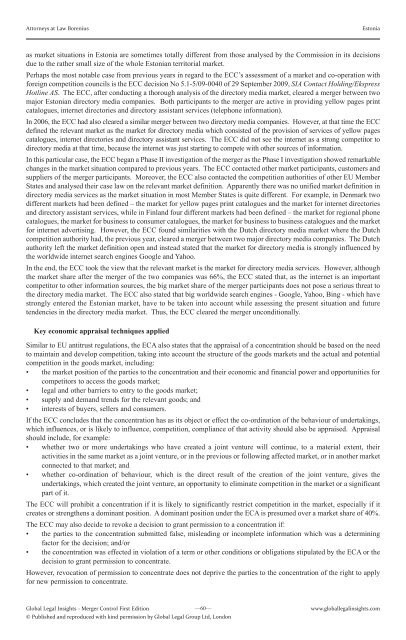Merger Controls First Edition - J Sagar Associates
Merger Controls First Edition - J Sagar Associates
Merger Controls First Edition - J Sagar Associates
Create successful ePaper yourself
Turn your PDF publications into a flip-book with our unique Google optimized e-Paper software.
Attorneys at Law Borenius Estonia<br />
as market situations in Estonia are sometimes totally different from those analysed by the Commission in its decisions<br />
due to the rather small size of the whole Estonian territorial market.<br />
Perhaps the most notable case from previous years in regard to the ECC’s assessment of a market and co-operation with<br />
foreign competition councils is the ECC decision No 5.1-5/09-0040 of 29 September 2009, SIA Contact Holding/Ekspress<br />
Hotline AS. The ECC, after conducting a thorough analysis of the directory media market, cleared a merger between two<br />
major Estonian directory media companies. Both participants to the merger are active in providing yellow pages print<br />
catalogues, internet directories and directory assistant services (telephone information).<br />
In 2006, the ECC had also cleared a similar merger between two directory media companies. However, at that time the ECC<br />
defined the relevant market as the market for directory media which consisted of the provision of services of yellow pages<br />
catalogues, internet directories and directory assistant services. The ECC did not see the internet as a strong competitor to<br />
directory media at that time, because the internet was just starting to compete with other sources of information.<br />
In this particular case, the ECC began a Phase II investigation of the merger as the Phase I investigation showed remarkable<br />
changes in the market situation compared to previous years. The ECC contacted other market participants, customers and<br />
suppliers of the merger participants. Moreover, the ECC also contacted the competition authorities of other EU Member<br />
States and analysed their case law on the relevant market definition. Apparently there was no unified market definition in<br />
directory media services as the market situation in most Member States is quite different. For example, in Denmark two<br />
different markets had been defined – the market for yellow pages print catalogues and the market for internet directories<br />
and directory assistant services, while in Finland four different markets had been defined – the market for regional phone<br />
catalogues, the market for business to consumer catalogues, the market for business to business catalogues and the market<br />
for internet advertising. However, the ECC found similarities with the Dutch directory media market where the Dutch<br />
competition authority had, the previous year, cleared a merger between two major directory media companies. The Dutch<br />
authority left the market definition open and instead stated that the market for directory media is strongly influenced by<br />
the worldwide internet search engines Google and Yahoo.<br />
In the end, the ECC took the view that the relevant market is the market for directory media services. However, although<br />
the market share after the merger of the two companies was 66%, the ECC stated that, as the internet is an important<br />
competitor to other information sources, the big market share of the merger participants does not pose a serious threat to<br />
the directory media market. The ECC also stated that big worldwide search engines - Google, Yahoo, Bing - which have<br />
strongly entered the Estonian market, have to be taken into account while assessing the present situation and future<br />
tendencies in the directory media market. Thus, the ECC cleared the merger unconditionally.<br />
Key economic appraisal techniques applied<br />
Similar to EU antitrust regulations, the ECA also states that the appraisal of a concentration should be based on the need<br />
to maintain and develop competition, taking into account the structure of the goods markets and the actual and potential<br />
competition in the goods market, including:<br />
• the market position of the parties to the concentration and their economic and financial power and opportunities for<br />
competitors to access the goods market;<br />
• legal and other barriers to entry to the goods market;<br />
• supply and demand trends for the relevant goods; and<br />
• interests of buyers, sellers and consumers.<br />
If the ECC concludes that the concentration has as its object or effect the co-ordination of the behaviour of undertakings,<br />
which influences, or is likely to influence, competition, compliance of that activity should also be appraised. Appraisal<br />
should include, for example:<br />
• whether two or more undertakings who have created a joint venture will continue, to a material extent, their<br />
activities in the same market as a joint venture, or in the previous or following affected market, or in another market<br />
connected to that market; and<br />
• whether co-ordination of behaviour, which is the direct result of the creation of the joint venture, gives the<br />
undertakings, which created the joint venture, an opportunity to eliminate competition in the market or a significant<br />
part of it.<br />
The ECC will prohibit a concentration if it is likely to significantly restrict competition in the market, especially if it<br />
creates or strengthens a dominant position. A dominant position under the ECA is presumed over a market share of 40%.<br />
The ECC may also decide to revoke a decision to grant permission to a concentration if:<br />
• the parties to the concentration submitted false, misleading or incomplete information which was a determining<br />
factor for the decision; and/or<br />
• the concentration was effected in violation of a term or other conditions or obligations stipulated by the ECA or the<br />
decision to grant permission to concentrate.<br />
However, revocation of permission to concentrate does not deprive the parties to the concentration of the right to apply<br />
for new permission to concentrate.<br />
Global Legal Insights <strong>Merger</strong> Control <strong>First</strong> <strong>Edition</strong><br />
—60—<br />
© Published and reproduced with kind permission by Global Legal Group Ltd, London<br />
www.globallegalinsights.com


